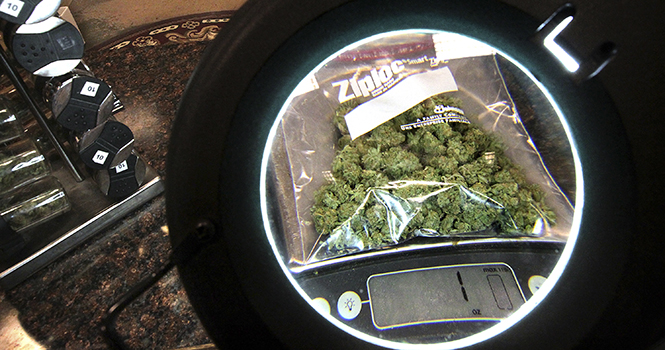On Washington campuses, debate about marijuana law’s impact
Washington state has a proposed law that will allow adults to possess up to one ounce of marijuana under government control and taxation. (Dean J. Koepfler/Tacoma News Tribune/MCT)
December 4, 2012
SEATTLE (MCT) — Officially, it’s still illegal until Thursday — and even then people will be breaking the law if they buy it on the street. But marijuana is so readily available near Washington college campuses that researchers and students alike are debating just how much Initiative 502 may affect use among young adults — already the most frequent users of pot.
Some researchers think more young adults will light up when the drug is no longer legally forbidden to those 21 and older. But students say it’s so easy to buy pot in college that anybody who wants to smoke is already doing so.
One-third of Washington’s young adults ages 18 to 25 have used marijuana in the past year, according to a national study. They’re almost three times more likely than the general population to have used pot in the last year.
An increase in use among young adults “really is hard to predict since we have not had a precedent like this,” said Jason Kilmer, assistant director of health and wellness for alcohol and drug education at the University of Washington and a research assistant professor in psychiatry and behavioral sciences.
Washington colleges and universities have been quick to emphasize that pot is still not welcome on campus, no matter what the new state law says. Institutions that receive federal money must keep a drug-free campus, in accordance with federal law that makes pot illegal. And a student caught with marijuana can be subject to disciplinary action, although students say campus police tend to be lenient with first offenders.
One researcher who thinks use will increase is Roger Roffman, a principal supporter of I-502 and a professor emeritus at the University of Washington who has studied marijuana use and dependency for nearly 30 years.
“Here’s my guess: Over the next years, we will see greater curiosity about marijuana, among those particularly in that [young adult] age range,” Roffman said. “Curiosity will lead more people to use it who otherwise wouldn’t have.”
That said, he also thinks the initiative will eventually lead to safer use of the drug. He threw his support behind the measure because he believes it will allow the state to do a better job of educating people about its effects and treating those who are dependent.
One federal study also hints at a possible uptick in use among young adults when marijuana becomes legal. In “Monitoring the Future,” a national survey that has been taking the pulse of student drug use since 1975, high school seniors were asked how legalization would affect their attitude toward the drug.
In the 2011 survey, 17 percent of all high-school seniors — about one in six — thought they would try marijuana, or their use would increase, if marijuana were legalized. [Of course, it will still be illegal for this age group.] Kilmer said that research on alcohol use has shown that increased access and availability are linked to increased use.
“We need to see if that will hold true with marijuana,” he said. “That’s a really good research question.”
Still, some doubt legalization will have any effect, at least among college students.
“The fact of the matter is that anyone who wants marijuana now is currently having no trouble getting it,” UW senior Nick Hagen wrote in an email. Hagen campaigned for I-502 and believes it’s possible to use marijuana responsibly, just as some consume alcohol responsibly.
Hagen said more experimentation might go on, but that students who now steer clear of marijuana do so not because it’s illegal but because they don’t want to affect their performance in school or work, or they worry about what their parents might think.
“I have trouble imagining a sharp, prolonged increase in marijuana use among college students, or adults in general,” he said.
Most students turn 21 late in their college careers, and the threat of an arrest can result in a loss of financial aid and can jeopardize future employment opportunities, he said.
Another UW student, who asked that his name not be used, said he thinks some students may give it a try but doubts use will be that much more widespread.
“Marijuana is completely available to anyone who wants it,” said the 26-year-old graduate student. “There are street-corner drug dealers everywhere.”
Roffman, the professor emeritus and backer of the pot measure, expects new norms to evolve on marijuana use, including norms that will discourage abuse.
“I think the way this initiative is written is going to feed into the gradual evolution of safer use, and better decision-making,” Roffman said.
Colleges and universities will be watching the state’s grand experiment in legalizing marijuana for another reason — it will open up all kinds of interesting avenues for drug-use researchers.
Christine M. Lee, a research associate professor in psychiatry and behavioral sciences, said researchers may want to look at changes in attitudes and perceptions of risk. That work might take place both in ongoing and future studies at the UW, she said.
Katherine Long, The Seattle Times












